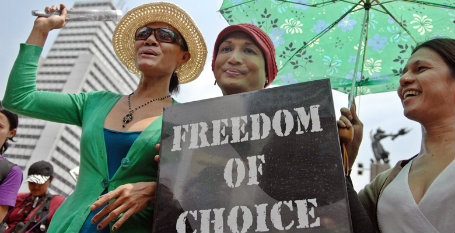The Indonesian Ulema Council (MUI) that met earlier this month said its fatwa was required due to an increase in "reports of deviant behavior."
“It doesn’t matter that they love each other,” Hasanuddin A.F., head of the MUI’s fatwa commission, said while announcing the anti-LGBT edict, reported The Jakarta Globe. “In Islamic law, it’s a sexual act that must be heavily punished. It would be bad if the government allows same-sex marriage.”
The proposed punishments range from caning to the death penalty for those in same-sex relations. “It also claims that homosexuality is a serious disease, but that like most other illnesses, it can be cured,” the newspaper said.
Hasanuddin pointed out that "Sodomy, homosexuals, gays and lesbians in Islamic law are forbidden and [it] is a vile act that is punishable by the death penalty."
The March 4 fatwa issued by the MUI is not legally binding because even though Indonesia is the world’s most populous Muslim country it has never been an Islamic state. But prejudices against the LGBT community are largely formed by Islam, whose followers make up about 90 percent of its 250 million people.
While Detik News reported that the fatwa was issued as a means of "reminding the public" that homosexuality is a "deviant" behavior that creates a "stain on the dignity of Indonesia," The Jakarta Globe quoted LGBT activist Hartoyo as saying that such an edict was the same as promoting hatred and motivating people to carry out violence against others.
"If the MUI dislikes homosexuals, it should express its disapproval through other means, in educated and peaceful ways. It shouldn’t shroud its message with hate and violence," Hartoyo said.
Haris Azhar, coordinator of the Commission for Missing Persons and Victims of Violence, described the MUI’s fatwa as regrettable and that the council has long tried to exceed its actual authority, according to The Jakarta Globe.
“It isn’t the duty of MUI to determine national law. The MUI is supposed to educate Indonesia’s Muslims. Proposing severe punishment [such as death] shows the MUI’s less-than-mature mind-set,” he was quoted as saying.
Human rights lawyer Todung Mulya Lubis was also quoted by The Jakarta Globe as saying that the MUI should get past the fact that homosexuality exists in Indonesia.
“Human rights don’t differ among people, whatever their sexual orientation,” he said adding that “The government mustn’t play favorites in protecting its citizens.”
However, The Independent newspaper pointed out that, “The propagation of intolerance is seen as particularly dangerous in this instance, given the MUI's influential position.”
Even though same-sex relations are not criminalized in Indonesia, some local ordinances portray it as immoral behavior. Last September the country’s utra-conservative Aceh province passed a law to punish same-sex relations with 100 lashes of the cane and in 2004 municipal authorities in South Sumatra outlawed all LGBT-related activity as “prostitution.”
The Indonesian Ulema Council (MUI) that met earlier this month said its fatwa was required due to an increase in "reports of deviant behavior."
“It doesn’t matter that they love each other,” Hasanuddin A.F., head of the MUI’s fatwa commission, said while announcing the anti-LGBT edict, reported The Jakarta Globe. “In Islamic law, it’s a sexual act that must be heavily punished. It would be bad if the government allows same-sex marriage.”
The proposed punishments range from caning to the death penalty for those in same-sex relations. “It also claims that homosexuality is a serious disease, but that like most other illnesses, it can be cured,” the newspaper said.
Hasanuddin pointed out that "Sodomy, homosexuals, gays and lesbians in Islamic law are forbidden and [it] is a vile act that is punishable by the death penalty."
The March 4 fatwa issued by the MUI is not legally binding because even though Indonesia is the world’s most populous Muslim country it has never been an Islamic state. But prejudices against the LGBT community are largely formed by Islam, whose followers make up about 90 percent of its 250 million people.
While Detik News reported that the fatwa was issued as a means of "reminding the public" that homosexuality is a "deviant" behavior that creates a "stain on the dignity of Indonesia," The Jakarta Globe quoted LGBT activist Hartoyo as saying that such an edict was the same as promoting hatred and motivating people to carry out violence against others.
"If the MUI dislikes homosexuals, it should express its disapproval through other means, in educated and peaceful ways. It shouldn’t shroud its message with hate and violence," Hartoyo said.
Haris Azhar, coordinator of the Commission for Missing Persons and Victims of Violence, described the MUI’s fatwa as regrettable and that the council has long tried to exceed its actual authority, according to The Jakarta Globe.
“It isn’t the duty of MUI to determine national law. The MUI is supposed to educate Indonesia’s Muslims. Proposing severe punishment [such as death] shows the MUI’s less-than-mature mind-set,” he was quoted as saying.
Human rights lawyer Todung Mulya Lubis was also quoted by The Jakarta Globe as saying that the MUI should get past the fact that homosexuality exists in Indonesia.
“Human rights don’t differ among people, whatever their sexual orientation,” he said adding that “The government mustn’t play favorites in protecting its citizens.”
However, The Independent newspaper pointed out that, “The propagation of intolerance is seen as particularly dangerous in this instance, given the MUI's influential position.”
Even though same-sex relations are not criminalized in Indonesia, some local ordinances portray it as immoral behavior. Last September the country’s utra-conservative Aceh province passed a law to punish same-sex relations with 100 lashes of the cane and in 2004 municipal authorities in South Sumatra outlawed all LGBT-related activity as “prostitution.”

